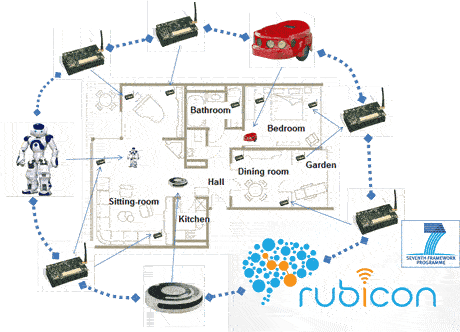by Mauro Dragone, Sameh Abdel-Naby, David Swords and Gregory M. P. O'Hare
A team of researchers from UCD’s Clarity Centre for SensorWeb Technology, Ireland, is leading the newly EU-funded project RUBICON (Robotic UBIquitous COgnitive Network). The project will develop a self-learning, adaptive robotic ecology consisting of mobile robotic devices, sensors, effectors and appliances cooperating to perform complex tasks such as supporting older persons to live independently in their own homes.
The principal goal of the project is to build systems whose components will encourage and teach one another in order to achieve their objectives more efficiently and to adapt to changing requirements and user's needs, as autonomously as possible. This will reduce the need for pre-programming and human supervision, and so will make these systems much cheaper and simpler to install and maintain in a variety of different homes and users.
RUBICON is a joint effort of nine partners from industry, research and the health sector, from five countries all over Europe and comprising about 400 person months at a cost of 3.3M€. The project commenced in April 2011 and its planned duration is three years. Rubicon will demonstrate the real-world value of its technology in two application environments, including an experimental facility for testing AAL applications.
Rubicon's researchers believe that self-learning robotic ecologies will reduce the complexity, and enhance the individual values of the devices involved by enabling new services that cannot be performed by any device by itself. Consider for instance the case of an automatic vacuum cleaner avoiding cleaning when any of the inhabitants are home after receiving information from the home alarm system, or the case of a robot monitoring a wireless sensor before seeking and warning the user that the stove was left on in the kitchen.
In order to effectively assist the user, current approaches strictly rely on models of the environment and of the daily activities they must recognize in order to provide context-aware services. However, they lack the ability to proactively and smoothly adapt to evolving situations, especially when these involve subtle changes in user's habits and preferences, or modifications to the environment. These limitations make such systems difficult to deploy in the real world, as they must be tailored to the specific apartments, services and users, and they can soon become unmanageably complex and expensive.
RUBICON will tackle these problems by developing self-sustaining learning solutions yielding cheaper, adaptive and efficient configuration and coordination of robotic ecologies.

Figure 1: RUBICON will merge robotic devices and sensor networks in a pervasive artificial brain that will autonomously learn to adapt to the environment and perform complex tasks to supporting older persons to live independently in their own homes.
To achieve its aims, the consortium will use a unique combination of expertise in cognitive robotics, robot and agent control systems, wireless sensor networks and machine learning to integrate planning and distributed control solutions with statistical and computational (neuroscience) methods. Each node of the ecology will contribute to a shared collective knowledge and memory while engaging in collaborative learning with the other nodes by interacting through remote synapses, mimicking those linking neurons in biological nervous systems. Bio-inspired, novelty detection and habituation mechanisms will make the system capable of self-improvement, self-configuration, and pro-activity in helping the user and seeking learning opportunities.
By contributing to the development of novel technologies that combine communication with control and learning for robotic ecologies, the potential impact of RUBICON includes:
- Rubicon will simplify the installation, the use, and the maintenance of robotic ecologies in AAL settings, by supporting self-learning systems which improve their performance over time and autonomously adapt to changes in their environment and in the behaviour and preferences of the user(s) they assist.
- Rubicon ecologies will improve the quality of service offered in AAL settings, without the need for extensive human involvement. The ability to discriminate and to autonomously learn about the environment and the human activities therein will improve the quality of AAL services which can be delivered to the users and promote their large scale adoption.
- RUBICON ecologies will adapt to changes in the resources available, including replacement/updates of robots, added/removed sensing/acting devices and appliances. This will offer improved fault tolerance, service reliability, but also the potential for enhanced performance on the fly.
RUBICON is a three-year project, funded by the European Union Seventh Framework Programme (FP7/2007-2013) under grant agreement No.269914 (“RUBICON”). The project commenced in April 2011.
The CLARITY Centre is a partnership between University College Dublin, Dublin City University and Tyndall National Institute, Cork, supported by a CSET grant from Science Foundation Ireland (SFI).
Link:
Rubicon Web Site: http://www.fp7rubicon.eu
Please contact:
Mauro Dragone
University College Dublin, Ireland
E-mail:










